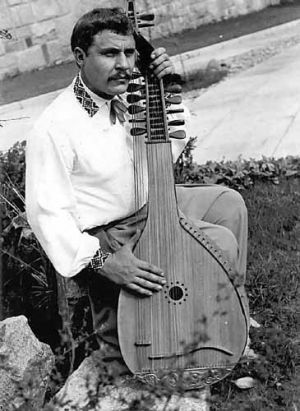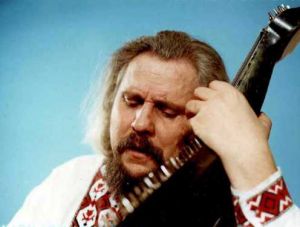LYTVYN, VASYL STEPANOVYCH (born June 4, 1941, in the village of Fedorivka, Pishchanobridskyi Raion, Kirovohrad Oblast). Kobzar.
His mother was a collective farmer, his father a railway worker. His childhood was spent in poverty. Vasyl began to doubt the correctness of his school upbringing when he heard his father sing a song about Khmelnytsky: “Oh, Bohdan, Bohdan, / You foolish son, / You have ruined our mother, / Mother Ukraine! / You have ruined her, and sold her / Because you had no sense / In your head.”
In 1960, he graduated from the Perchunove ten-year school. Together with his brother Mykola, he entered the Krolevets Vocational School of Artistic Weaving in 1961—thus they escaped from collective-farm serfdom. The brothers learned to play the bandura from Mykhailo Biloshapka, the director of the bandurist capella at the local weaving factory. In 1961, they entered the R. Glier Kyiv Music College. They studied there until 1963. At night, they earned their bread by unloading wagons and working as stokers. They sang in the “Zhaivoronok” (Lark) inter-university student choir (led by Borys Riabokliach), traveled with the choir in 1962 to Shevchenko’s places, participated in the commemoration of T. Shevchenko on May 22, performed in workers’ dormitories, and communicated with the young creative intelligentsia. Consequently, they were under KGB surveillance. When their bandura teacher, Andriy Omelchenko, was forced to leave the college, his brother Mykola went to Ternopil, while Vasyl was left without any financial support and had to abandon his studies. He went to Chernihiv and worked in the philharmonic (1964–65). There, he could not reconcile himself with the low professional level of the bandurist ensemble. Together with his brother Mykola, they auditioned for the Kyiv Philharmonic. They were not accepted—due to their “nationalist” sentiments. In July 1965, his brother Mykola was arrested and released a month later. After a conversation with a KGB officer, they were finally accepted into the Ternopil Philharmonic, but the brothers’ concert career was short-lived: in 1966, Vasyl was drafted into the army—despite the conclusion of the medical commission from previous years.
From November 1967 to April 1968, L. worked in the locomotive depot at Pomichna station in the Kirovohrad region. At the request of Alla Horska, he was hired as the artistic director of the bandurist ensemble at the Boryspil House of Culture and lived with his wife, Antonina Harmash, in the village of Ivankiv. He organized thematic evenings with figures of the national movement and started an ensemble and a drama club.
After a concert at the “Molod” publishing house (1969), Dmytro Cherednychenko (from the Music and Choral Society) recommended L. to the newly created Kyiv Orchestra of Ukrainian Folk Instruments (led by Yakiv Orlov). At the famous kobzars’ concert at the Opera Theater, he sang the song about Petro Kalnyshevsky, “Oh Fly, Jackdaw.” He toured with the orchestra throughout Ukraine and many countries around the world. The Lytvyn brothers’ duet was met with admiration, so they were dismissed at the demand of the KGB.
The family moved to the village of Hrebeni in the Kaharlyk Raion. He worked at the village house of culture. He organized a folk theater and an agitation brigade. Due to his patriotic repertoire and criticism of the authorities, he had conflicts with the raion party committee. From 1981, he was a freelance graphic artist for the “Naukova Dumka” publishing house. From July 1989, he was a soloist-artist at the “Kyivkontsert” concert and lecture association.
In September 1989, L. co-founded the one-of-a-kind school of kobzar art (now the Stritivka Higher Pedagogical School of Kobzar Art). He performs in concerts and at public events, and together with his wife, Antonina Harmash, he conducts lecture-concerts on patriotic themes; they are the authors of the “School for Future Fathers and Mothers” project.
L. is a bearer of the high-spirited, ancient Ukrainian kobzar tradition. He is characterized by dramatic transformation, expressive singing, and instrumental improvisation. The artist’s work includes over 100 original songs. He has performed in many countries. Several films have been made with his participation. He is an Honored Artist of Ukraine (1990), an Excellence in Education of Ukraine awardee (1993), a laureate of the I. Nechuy-Levytsky Literary and Arts Prize (1995), was awarded the Order of Merit, III Class (2010), and is the chairman of the Union of Kobzars of Ukraine. He lives in the village of Hrebeni.
Bibliography:
Vasyl Lytvyn: In My Soul, I Am a Great Rebel // Ukraina Moloda, 2009. – August 28. http://ukrrevue.ucoz.ua/blog/2009-08-28-76
Autobiographical sketch by Vasyl Lytvyn.
Compiled on May 21, 2011, by Vasyl Ovsiienko (KhPG) based on materials from V. Lytvyn and Antonina Harmash.

